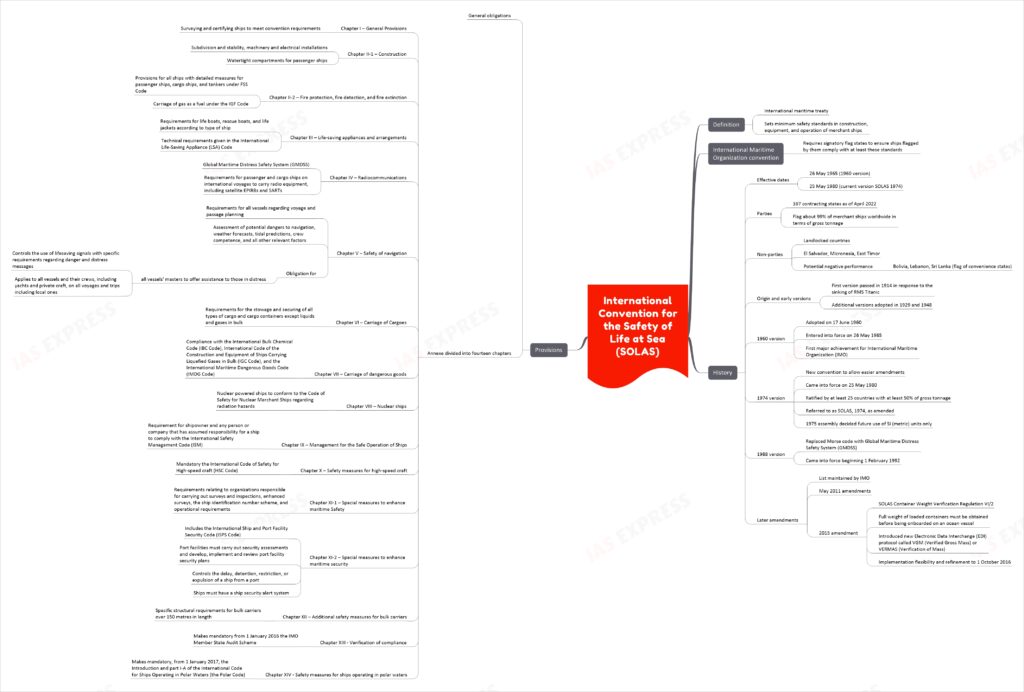International Convention for the Safety of Life at Sea (SOLAS) (1974)
This topic of “International Convention for the Safety of Life at Sea (SOLAS) (1974)” is important from the perspective of the UPSC IAS Examination, which falls under General Studies Portion.
I. Definition
- International maritime treaty that sets minimum safety standards for construction, equipment, and operation of merchant ships.
- It is an International Maritime Organization (IMO) convention.
- Requires signatory flag states to ensure ships flagged by them comply with at least these standards.
II. History
- Effective dates:
- 26 May 1965 (1960 version)
- 25 May 1980 (current version SOLAS 1974)
- Parties:
- 167 contracting states as of April 2022.
- Flag about 99% of merchant ships worldwide in terms of gross tonnage.
- Non-parties:
- Landlocked countries.
- El Salvador, Micronesia, East Timor.
- Potential negative performance: Bolivia, Lebanon, Sri Lanka (flag of convenience states).
- Origin and early versions:
- First version passed in 1914 in response to the sinking of RMS Titanic.
- Additional versions adopted in 1929 and 1948.
- 1960 version:
- Adopted on 17 June 1960.
- Entered into force on 26 May 1965.
- First major achievement for IMO.
- 1974 version:
- New convention to allow easier amendments.
- Came into force on 25 May 1980.
- Ratified by at least 25 countries with at least 50% of gross tonnage.
- Referred to as SOLAS, 1974, as amended.
- 1975 assembly decided future use of SI (metric) units only.
- 1988 version:
- Replaced Morse code with Global Maritime Distress Safety System (GMDSS).
- Came into force beginning 1 February 1992.
- Later amendments:
- List maintained by IMO.
- May 2011 amendments.
- 2015 amendment:
- SOLAS Container Weight Verification Regulation VI/2.
- Full weight of loaded containers must be obtained before being onboarded on an ocean vessel.
- Introduced new Electronic Data Interchange (EDI) protocol called VGM (Verified Gross Mass) or VERMAS (Verification of Mass).
- Implementation flexibility and refinement to 1 October 2016.
III. Provisions
- General obligations.
- Annexe divided into fourteen chapters:
- Chapter I – General Provisions:
- Surveying and certifying ships to meet convention requirements.
- Chapter II-1 – Construction:
- Subdivision and stability, machinery and electrical installations.
- Watertight compartments for passenger ships.
- Chapter II-2 – Fire protection, fire detection, and fire extinction:
- Provisions for all ships with detailed measures for passenger ships, cargo ships, and tankers under FSS Code.
- Carriage of gas as a fuel under the IGF Code.
- Chapter III – Life-saving appliances and arrangements:
- Requirements for lifeboats, rescue boats, and life jackets according to the type of ship.
- Technical requirements given in the International Life-Saving Appliance (LSA) Code.
- Chapter IV – Radiocommunications:
- Global Maritime Distress Safety System (GMDSS).
- Requirements for passenger and cargo ships on international voyages to carry radio equipment, including satellite EPIRBs and SARTs.
- Chapter V – Safety of navigation:
- Requirements for all vessels regarding voyage and passage planning.
- Assessment of potential dangers to navigation, weather forecasts, tidal predictions, crew competence, and all other relevant factors.
- Chapter VI – Carriage of Cargoes:
- Requirements for the stowage and securing of all types of cargo and cargo containers except liquids and gases in bulk.
- Chapter I – General Provisions:
-
-
Chapter VII – Carriage of dangerous goods:
-
Compliance with the International Bulk Chemical Code (IBC Code), International Code of the Construction and Equipment of Ships Carrying Liquefied Gases in Bulk (IGC Code), and the International Maritime Dangerous Goods Code (IMDG Code).
-
-
Chapter VIII – Nuclear ships:
- Nuclear-powered ships to conform to the Code of Safety for Nuclear Merchant Ships regarding radiation hazards.
-
Chapter IX – Management for the Safe Operation of Ships:
- Requirement for shipowners and any person or company assuming responsibility for a ship to comply with the International Safety Management Code (ISM).
-
Chapter X – Safety measures for high-speed craft:
- Mandatory compliance with the International Code of Safety for High-speed Craft (HSC Code).
-
Chapter XI-1 – Special measures to enhance maritime safety:
- Requirements relating to organizations responsible for carrying out surveys and inspections, enhanced surveys, the ship identification number scheme, and operational requirements.
-
Chapter XI-2 – Special measures to enhance maritime security:
- Includes the International Ship and Port Facility Security Code (ISPS Code).
- Port facilities must carry out security assessments and develop, implement, and review port facility security plans.
- Controls the delay, detention, restriction, or expulsion of a ship from a port.
- Ships must have a ship security alert system.
-
Chapter XII – Additional safety measures for bulk carriers:
- Specific structural requirements for bulk carriers over 150 meters in length.
-
Chapter XIII – Verification of compliance:
- Makes the IMO Member State Audit Scheme mandatory from 1 January 2016.
-
Chapter XIV – Safety measures for ships operating in polar waters:
- Makes the Introduction and part I-A of the International Code for Ships Operating in Polar Waters (the Polar Code) mandatory from 1 January 2017.
-


